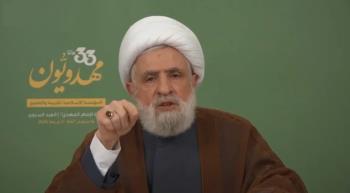Alwaght- Reports suggest that Palestinian resistance forces after a year of barbarous Israeli aggression on Gaza have succeeded in recycling the used Israeli ammunitions and using them against the Israeli occupation.
According to a report published by Khaleej Online website, the Palestinian resistance in the second year of Israeli invasion of the enclave continues to confront a full-scale Israeli army in the streets of Gaza. The Palestinian forces have also managed to use unexploded ordnance in the missiles and bombs dropped by the occupation forces and warplanes.
Reports say that Qassam Brigades, the military wing of the Hamas Movement, use the remnants of Israeli rockets to make explosives and write on them: "We will return your goods."
Inflicting damage on the occupiers with their own weapons
According to reports, Qassam forces have been able to inflict heavy damage on the ranks of the occupation army by using the remnants of Israeli missiles and recycling them for attacks, including the latest attack targeting an Israeli infantry force in a precise ambush in a house west of the Jabalia camp north of the Gaza Strip.
Some videos released by the Qassam forces show a number of Palestinian fighters targeting a group of soldiers in a house in the Gaza Strip with GBU bombs belonging to Israel. This clip ended with the sentence "we will return your goods".
It was previously reported that Qassam members were able to destroy 5 Israeli tanks with all their personnel using two two-ton bombs that the invaders fired at civilian homes, but did not explode.
Special unit
Qassam Brigades have also formed a special unit to recover large and unexploded bullets and bombs so that these people can examine the unexploded ordnance after neutralizing them and investigate how to use them, as these weapons usually contain very dangerous substances and a lot of experience is needed for dealing with them.
The stages of using the unexploded weapons of the Israeli army by the Palestinian resistance forces also include the study of structures and analysis of materials, the stage of extracting explosives, then threading the warheads and engines, pouring explosives, installing explosive warheads on the engines and supplying missiles and launching them at targets.
Yousef al-Sharghawi, a military analyst, suggests that the Palestinian resistance in Gaza has no other way than relying on its capabilities and examining all the ways to counter the Israeli occupation. Al-Sharghawi told Al-Arabi news that after a year of using its military wares, the resistance needs more weapons and that is why it uses the unexploded ordnance of the Israelis against them.
Reports also show that the materials that the Palestinian resistance obtained from Israeli rockets and unexploded shells have a very strong effect because they are made from Israeli chemicals that have high explosive capabilities.
Israeli military exhaustion in Gaza and high casualties
Haaretz newspaper reported that the number of Israeli soldiers killed by planted bombs compared to those killed by anti-tank rockets and other weapons in Gaza last month has seen an increase.
According to the Palestinian Information Center, the number of Israeli soldiers killed in October reached 17, 11 of whom died due to bomb explosions. Of these, 5 people were killed in Jabalia, 3 in Rafah and 3 others in Netsarim Corridor in central Gaza. This newspaper emphasized that they were killed due to the explosion of bombs planted in houses and other buildings.
Harretz further reported that the reason for failure to discover the planted explosives is the Israeli policy of reducing reliance on the air force and backing the ground forces will artillery fire.
The newspaper continued that in the past months, special measures were taken before the soldiers entered the buildings. This included air force bombing the target buildings in order to detonate any explosive material inside the buildings by creating a strong blast wave. But recently, the use of this method before entering buildings has decreased.
The Israeli army claims that due to the weapons restrictions imposed on Tel Aviv by the countries that supply air force equipment and military operations in Lebanon, which has now become the priority of the army, it has reduced the use of such methods.
However, some senior Israeli officers stress that the weapons restrictions do not impact air and artillery cover provided before attacks on the enemy infrastructure.
Haaretz further suggests, citing army commanders, that the Israeli military shifts to alternative methods like carrying explosives inside the buildings using remotely-controlled carriers to minimize dangers and threats to life of the troops.



























